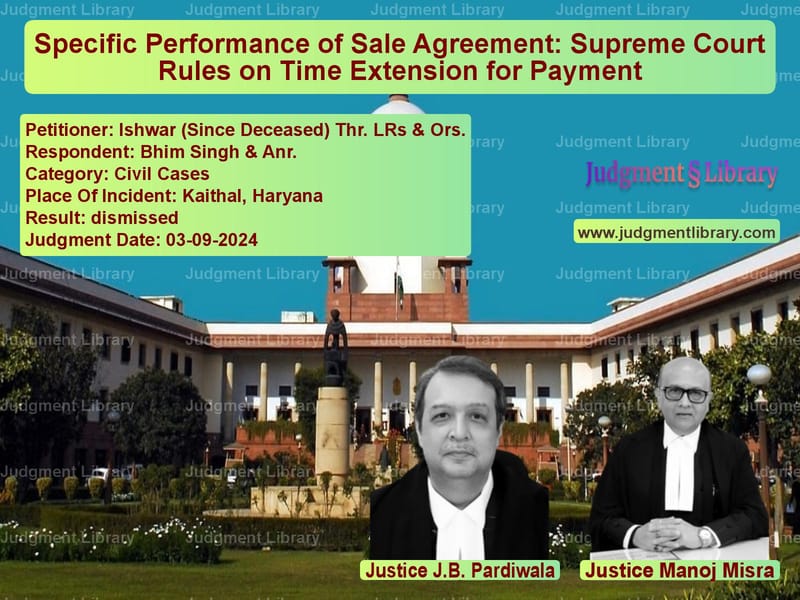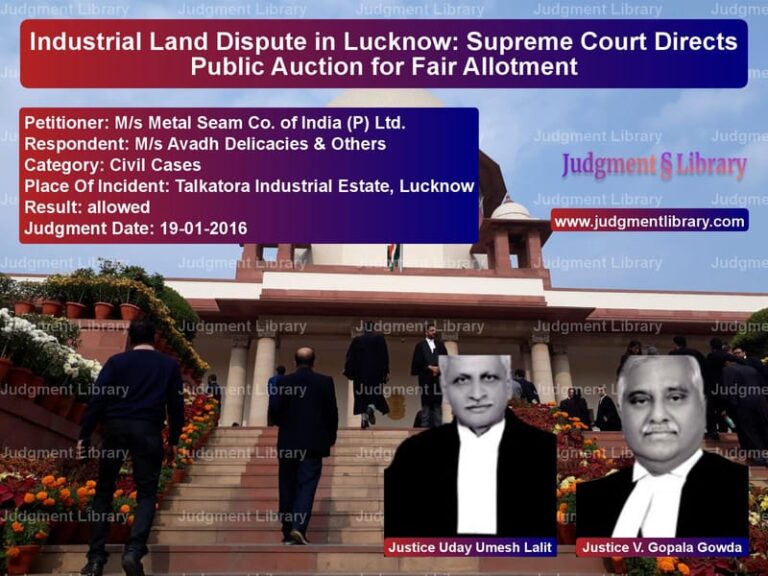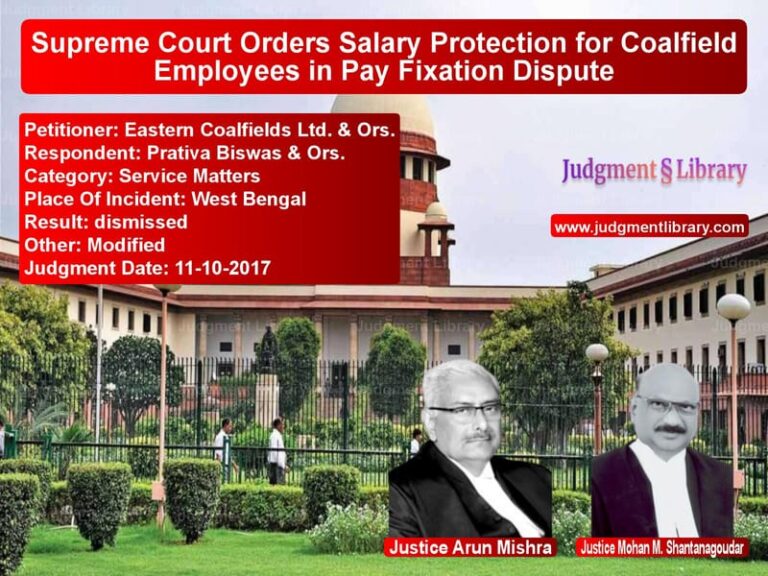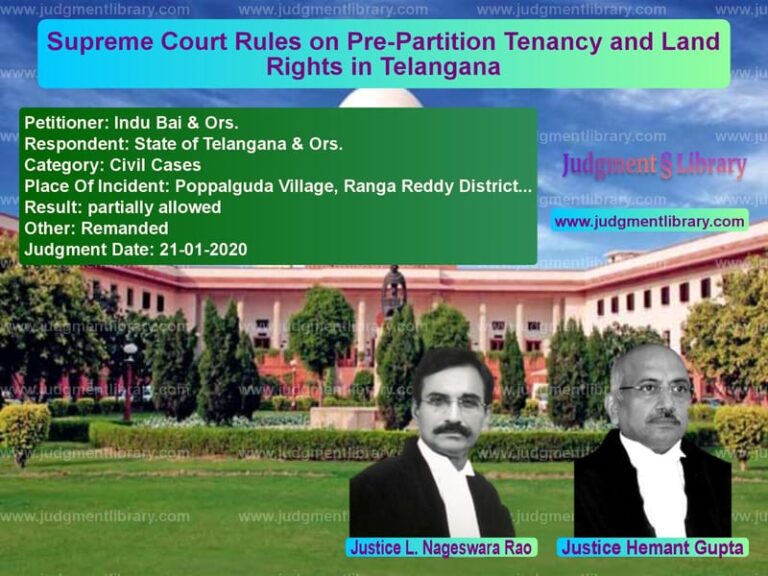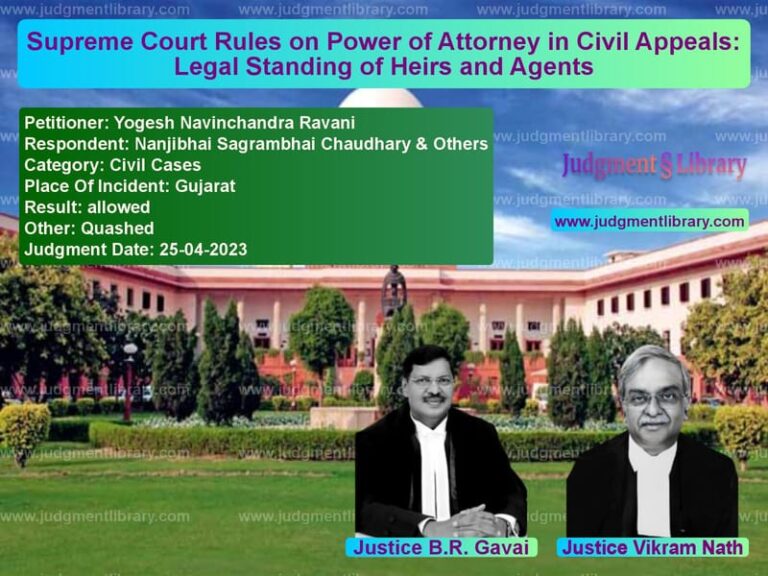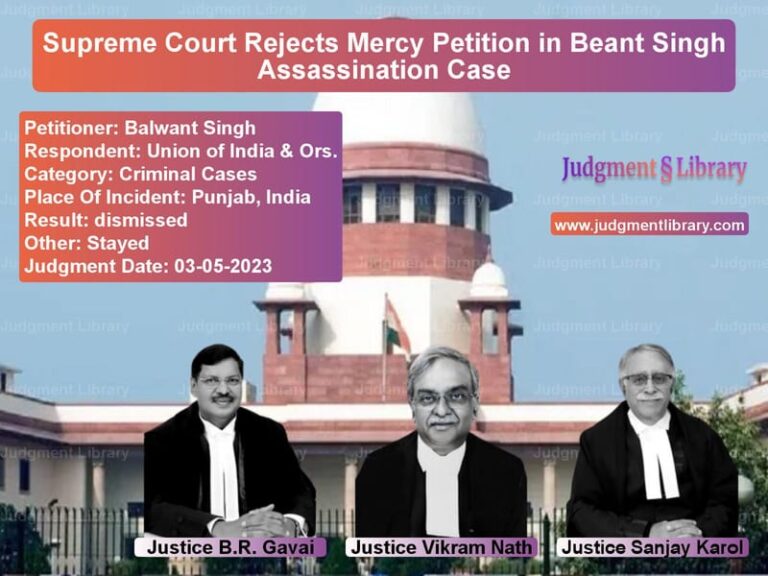Specific Performance of Sale Agreement: Supreme Court Rules on Time Extension for Payment
The case of Ishwar (Since Deceased) Thr. LRs & Ors. vs. Bhim Singh & Anr. revolved around the execution of a sale agreement and the delay in payment of the balance consideration by the decree-holder. The Supreme Court ruled that the execution court was justified in extending the time for deposit, dismissing the judgment-debtor’s appeal to rescind the contract.
Background of the Case
The respondents (plaintiffs) had entered into an agreement to purchase property from the appellants (defendants) on May 18, 2005 for Rs. 18 lakhs, out of which Rs. 9.77 lakhs was paid as earnest money. However, the sale deed was not executed despite notice.
The trial court, on February 28, 2011, decreed the suit in part, directing a refund of the earnest money with interest but rejecting specific performance. The appellate court, on January 12, 2012, reversed this and granted specific performance, allowing the respondents to deposit the balance consideration within two months.
The decree-holders then filed an execution application on March 20, 2012. The judgment-debtors pursued a second appeal, which was dismissed on November 7, 2013. After this, the decree-holders sought permission from the execution court to deposit the balance amount, which the judgment-debtors opposed.
Key Legal Issues
- Did the execution court have jurisdiction to extend the time for payment of the balance sale consideration?
- Did the delay in deposit justify rescission of the contract under Section 28 of the Specific Relief Act, 1963?
- Was the decree-holder ready and willing to perform their obligations under the agreement?
Arguments by the Appellants (Judgment-Debtors)
The judgment-debtors contended that:
- The execution court lacked jurisdiction to extend the time for deposit, as the decree was passed by an appellate court.
- The decree explicitly required payment within two months; since no extension was sought within that period, the contract stood rescinded.
- The decree-holders were not diligent in making the payment and instead delayed the process.
Arguments by the Respondents (Decree-Holders)
The decree-holders countered that:
- The execution application was filed on time, and they had continuously pursued legal remedies.
- The delay was due to the pending second appeal by the judgment-debtors, which hindered execution of the decree.
- The decree did not specify a mode of payment, and they acted in good faith by seeking court permission to deposit the balance.
Supreme Court’s Observations
1. Execution Court’s Jurisdiction
The Court held that an execution court has the power to extend time for deposit, even if the decree was passed by an appellate court:
“An application under Section 28 of the Specific Relief Act can be entertained by the execution court if it is the same court that originally passed the decree. The decree merges into the appellate decree and remains executable by the court of first instance.”
2. Readiness and Willingness of the Decree-Holders
The Court found that the decree-holders had made bona fide efforts to comply with the decree:
“The decree-holders promptly filed an execution application and sought permission to deposit the balance amount. The delay was caused by the judgment-debtors’ prolonged litigation.”
3. Discretion to Extend Time
The Court ruled that the execution court had discretion to extend the time for deposit:
“Section 28 does not automatically rescind a contract due to delay. The court must consider the circumstances and determine if the delay was intentional or due to unavoidable reasons.”
4. Judgment-Debtors’ Conduct
The Court noted that the judgment-debtors had been unwilling to execute the sale deed and instead pursued prolonged litigation:
“The appellants, rather than complying with the decree, engaged in multiple legal proceedings, delaying the execution. This conduct cannot be used to deprive the decree-holders of their rights.”
Final Judgment
The Supreme Court dismissed the appeal, upholding the execution court’s decision to allow the deposit and proceed with the sale deed execution:
“The execution court was justified in allowing the deposit and rejecting the application for rescission. The appeal is devoid of merit and stands dismissed.”
Impact of the Judgment
This ruling clarifies several important legal principles:
- Execution courts have discretion to extend the time for deposit even if the decree was passed by an appellate court.
- Delay does not automatically lead to rescission; the court must examine the bona fides of the decree-holder.
- Judgment-debtors cannot benefit from litigation delays to avoid executing sale agreements.
- Courts will prioritize substantial justice over technical arguments concerning payment deadlines.
This judgment strengthens the legal framework for enforcing sale agreements and ensures that decree-holders are not unfairly deprived of their rights due to procedural delays.
Petitioner Name: Ishwar (Since Deceased) Thr. LRs & Ors..Respondent Name: Bhim Singh & Anr..Judgment By: Justice J.B. Pardiwala, Justice Manoj Misra.Place Of Incident: Kaithal, Haryana.Judgment Date: 03-09-2024.
Don’t miss out on the full details! Download the complete judgment in PDF format below and gain valuable insights instantly!
Download Judgment: ishwar-(since-deceas-vs-bhim-singh-&-anr.-supreme-court-of-india-judgment-dated-03-09-2024.pdf
Directly Download Judgment: Directly download this Judgment
See all petitions in Property Disputes
See all petitions in Contract Disputes
See all petitions in Specific Performance
See all petitions in Judgment by J.B. Pardiwala
See all petitions in Judgment by Manoj Misra
See all petitions in dismissed
See all petitions in supreme court of India judgments September 2024
See all petitions in 2024 judgments
See all posts in Civil Cases Category
See all allowed petitions in Civil Cases Category
See all Dismissed petitions in Civil Cases Category
See all partially allowed petitions in Civil Cases Category

